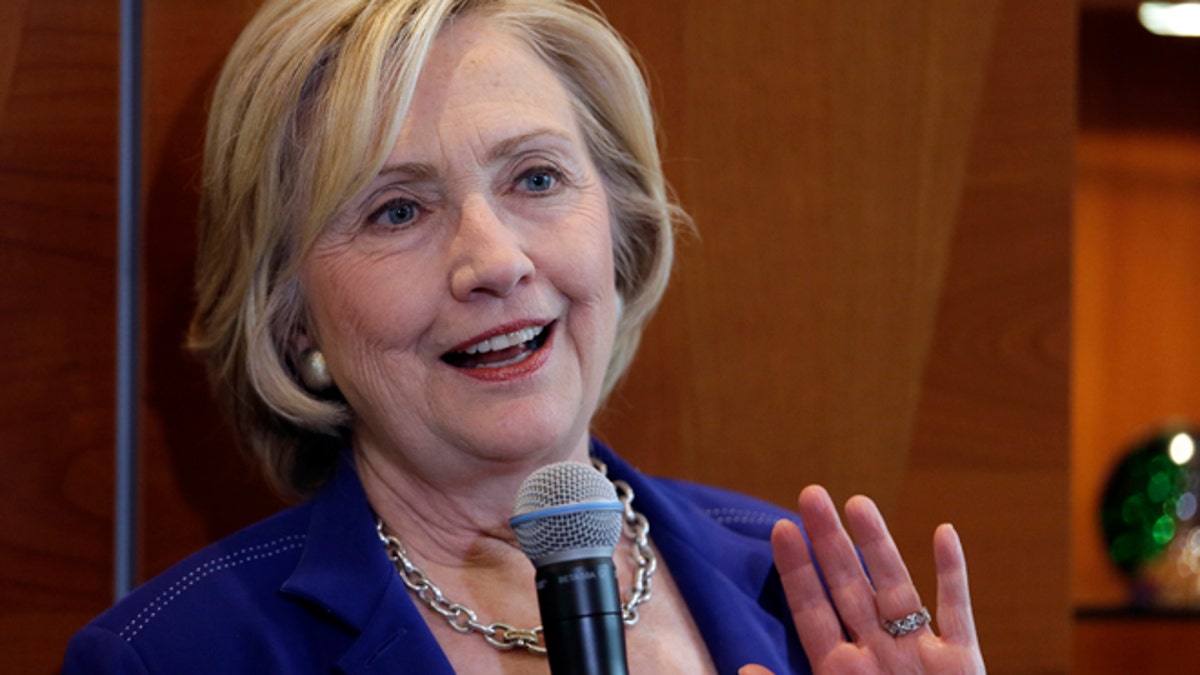
July 7, 2015: Democratic presidential candidate Hillary Rodham Clinton speaks during a house party hosted by Nancy Emanuel, a retired Nurse and former instructor at Indian Hills Community College in Ottumwa, and her husband, Dennis Emanuel, an attorney in Ottumwa, Iowa. (AP Photo/Charlie Neibergall)
Hillary Clinton does no favors to her presidential campaign and her credibility by declaring that, “I want to be the small business president -- somebody who makes it easier for [small businesses] to get started, to grow… to try to optimize the opportunity side of the equation.”
Neither the facts nor even a former counselor and domestic strategist to President Bill Clinton support Hillary Clinton’s claims to be a small business champion.
The National Federation of Independent Business (NFIB), representing 350,000 small businesses nationwide, did a comprehensive review of Hillary Clinton’s voting record when she was a U.S. senator. The NFIB found that Clinton voted against policies favored by small businesses most of the time in several areas, such as spurring economic recovery and growth, increasing access to lower health insurance costs, eliminating frivolous lawsuits and providing tax relief.
Jack Mozloom, media and communications director, National Federation of Independent Business, said that during Clinton’s eight years in the Senate, she voted against legislation supported by NFIB members an average 75 percent of the time.
And, reviewing Hillary Clinton’s recent economic plan, which included recommendations relating to small businesses, Bill Curry, former adviser to President Bill Clinton wrote, “The country could use a fresh, unbiased analysis of the existing order. Clinton’s speech provided nothing of the sort [and] if you parse Hillary’s speech you find that despite talking for 55 minutes she didn’t make any promises, or at least none specific enough to be politically actionable. Aides say she must seem more authentic, but it can’t help that her policies are so vague or that her anecdotes seem so canned. Clinton says she wants to be the ‘small-business president.’ I think she means it, but I don’t think she knows what it means.”
The proof is that Clinton has made statements demonstrating just how out of touch she is not only with the real world problems of small businesses, but also with the facts.
For example, on the campaign trail in Keene, NH, Clinton said, "From my perspective, I want to be sure that we get small businesses starting and growing in America again. We have stalled out. I was very surprised to see thatwhen I began to dig into it because people were telling me this, as I traveled around the country the last two years, but I didn’t know what they were saying, and it turns out that we’re not producing as many small businesses as we used to. And a recent world study said that we are 46th in the world in the difficulty to start a small business.”
She was “surprised” that small businesses are struggling during the Obama-Clinton years of big government control? If Clinton is as well informed as her supporters believe, she couldn’t have missed that The Brookings Institution, a liberal think tank, found as far back as last year that “for the first time on record U.S. businesses are being destroyed faster than they're being created.” And surely she has heard that for years, small businesses have blamed stunted job creation and business growth on laws and policies that Clinton is on record as enthusiastically backing -- notably ObamaCare and Dodd-Frank.
As Investor Business Daily reported, “A 2013 Gallup poll found that ObamaCare caused nearly half of small businesses to freeze hiring and a fifth of them to cut jobs. Another 38 percent of entrepreneurs said they ‘have pulled back on their plans to grow their business because of ObamaCare. Meanwhile, small-business owners complain that new financial regulations mandated under the Dodd-Frank Act have dried up startup capital.”
A survey released by the National Small Business Association in 2014 found that complying with Obamacare costs a small business, on average, more than $15,000 a year.
Holly Wade, NFIB’s research director, told the Senate Finance Committee in March that because of ObamaCare, “62 percent of small business owners are paying higher premiums, while only 8 percent say their costs have dropped.”
In a LinkedIn post titled “Four Ways to Jump-Start Small Business,” Clinton listed “cutting red tape, expanding access to capital, providing tax relief and tax simplification, and expanding access to new markets.”
Yet, in complete contradiction to each of those proposals is Clinton’s record documenting her votes for higher taxation, higher regulation and higher amounts of litigation, strangling small businesses. According to the friendliness-to-small-business rating system of the Small Business and Entrepreneurship Council, “during her tenure in the U.S. Senate, Clinton scored 7 percent in 2001-2002, 21 percent in 2004, and 9 percent in 2005.”
As PJ Media’s Ed Driscoll recalled, “When told [in 1994, that HillaryCare, the prototype for ObamaCare] could bankrupt small businesses, Mrs. Clinton sighed, “I can’t be responsible for every undercapitalized small business in America.” Twenty years later, in the run-up to her presidential bid, Clintontold a political rally in Boston that, “Don’t let anybody tell you that, ah, you know, it’s corporations and businesses that create jobs.”
With a recent poll showing that Americans rate Clinton at a 14-year low in honesty and trustworthiness, her pledge “to be the small business president” deserves this reaction: “Hill-arious!”




















